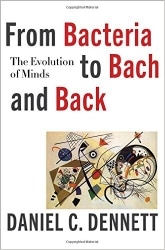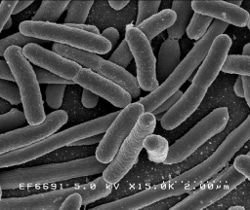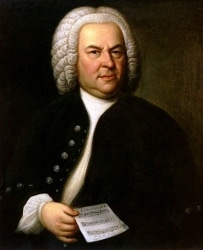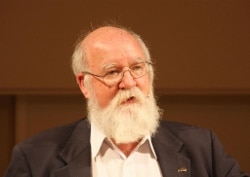Evolutionary cogitations…
Author: Daniel C. Dennett
 How did we get here? Specifically, how did we end up with these remarkable (if not always entirely rational) mentation devices in our skulls? Even more specifically, how did our minds evolve, providing us the mental space to contemplate the world in all its fascinating complexity? For millennia, the wise ones simply assumed that God must have gifted humanity with this special skill that seems to set us apart from all his other creations. But what if they were wrong? In an adventure of amazing scope and fortitude, acclaimed philosopher Daniel C. Dennett explains how it actually happened in From Bacteria to Bach and Back.
How did we get here? Specifically, how did we end up with these remarkable (if not always entirely rational) mentation devices in our skulls? Even more specifically, how did our minds evolve, providing us the mental space to contemplate the world in all its fascinating complexity? For millennia, the wise ones simply assumed that God must have gifted humanity with this special skill that seems to set us apart from all his other creations. But what if they were wrong? In an adventure of amazing scope and fortitude, acclaimed philosopher Daniel C. Dennett explains how it actually happened in From Bacteria to Bach and Back.
One of the “Four Horsemen of New Atheism”, Dennett is often linked with authors Richard Dawkins, Sam Harris and the late Christopher Hitchens as the most prominent protagonists in the resurgence of atheism over the past decade. He also happens to be the only one of the four that I hadn’t previously read. So it was with enthusiasm that I approached this formidable tome. I’m happy to report that the man is clearly worthy of his place in this collective of acclaimed atheist thinkers.
Needless to say, outlining the step-by-step process by which the complex human mind developed from a starting point as simple as a bacterium is no small task and Dennett fully recognizes this. With the wisdom that comes with over fifty years of experience in teaching and writing in the field, he meticulously assembles each piece of his argument with care, thoughtfully and patiently bringing the reader along as he proceeds. Impressively, despite the daunting task he’s set out for himself, he manages to do this is in a consistently relaxed and affable manner. I have to admit to intermittent skepticism as I read the first half of From Bacteria to Bach and Back, but my doubts completely evaporated as Dennett’s carefully constructed argument surged to a thoroughly satisfying conclusion.
Relying on well-established Darwinian natural selection for the journey from the simplest life forms to the complex vertebrate brain, he ventures into more contentious territory for the rest of the trip. Arguing for the primacy of memetic evolution in the final steps toward a mind that can fully contemplate itself, Dennett shows how “selfish” memes – words being the most prominent and widespread example –propelled the development of the human mind to its present complexity. Just like their viral counterparts, memes found a susceptible host and changed the course of evolution.
The idea that memes – literally competing for space in our brains – were the driving force in our mental evolution seems overly bizarre and counterintuitive. Not surprisingly, there are plenty of smart people who disagree with this idea. But importantly, the theory allows for a gradualistic explanation for the existence of our minds; one that doesn’t require a leap of faith or the hand of a god. Dennett doesn’t shy away from these prickly issues, enthusiastically taking on notables like Noam Chomsky and Steven Pinker with confidence, thoughtfully revealing where their ideas fall short.
Dennett also spends much of the book arguing that it’s the norm for competency to exist without comprehension. Entities like bacteria, honey bees and human liver cells can perform very complex tasks without understanding why they do what they do. Similarly, most of the tasks that a human body performs each day don’t require any knowledge of the big picture. It wasn’t until memes took hold in the human brain that the mental space was available to allow us to think about our thoughts. With eagerness and clarity, Dennett explains how this unique transition took place, one small step at a time. It’s an extraordinary and enjoyable journey that often stretched my own mind to its limits.
In the end, From Bacteria to Bach and Back is a remarkably readable exploration of the evolution of the human mind by an influential philosopher and gifted writer. It’s a truly ambitious project, ingeniously assembled with care, that lives up to the idea that extraordinary claims require extraordinary evidence. It actually turns that concept on its head, arguing that all other theories make claims that are actually much more extraordinary than anything Dennett proposes. Transporting the reader from the simplest of life forms to the pinnacle of human achievement, the book is sure to intrigue anyone interested in what it means to be human. Highly recommended.
— D. Driftless
author photo by Mathias Schindler (CC BY-SA 3.0)
Readers Lane reviews of books by the other horsemen:
Richard Dawkins: The Alabama Insert / An Appetite for Wonder / Brief Candle in the Dark
Christopher Hitchens: Arguably / Mortality
[AMAZONPRODUCTS asin=”0393242072″]
- Best Non-Fiction of 2016 - February 1, 2017
- Little Free Library Series — Savannah - May 22, 2015
- Little Free Library Series — Wyoming - November 30, 2014




